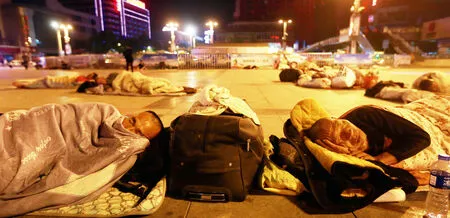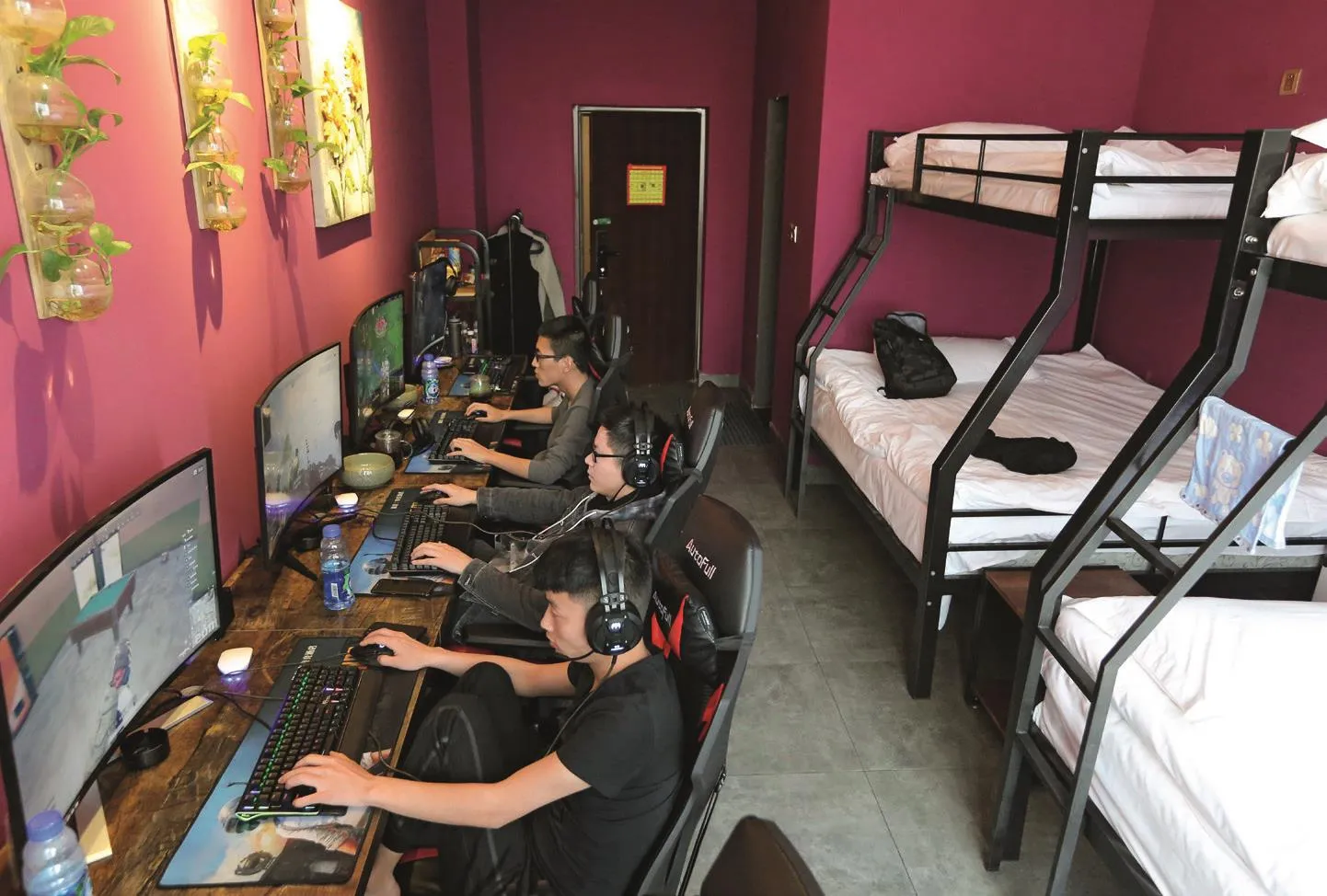After Hours
By Zheng Yiwen (郑怡雯) and Hatty Liu

Photograph from VCG
From migrant workers seeking refuge to budget-conscious tourists, public sleeping in China reveals a tapestry of urban social dynamics
公共场所“留宿”演变:从“无处可去”的农民工到海底捞过夜的游客
In the early hours of the morning,Majuqiao’s streets remain lively with bright neon lights from restaurants, internet cafes,and old-fashioned bathhouses.In a poorly lit stairwell, a man sits huddled, sound asleep, while a group of men gather on the sidewalk in an intense game of Chinese chess,seemingly determined to spend the entire night playing.
Situated on the southeastern outskirts of Beijing, Majuqiao serves as a gathering spot for day laborers who work in the nearby Yizhuang industrial zone, where the headquarters of e-commerce giant JD.com and other businesses are located.These laborers form the backbone of a complex logistics system, taking on temporary jobs in large factories such as sorting,unloading, carrying, and cleaning.They work long shifts of up to 12 hours and, come nightfall,many remain in the area, searching for a public place to sleep and recharge—some out of necessity, some by choice.
No shelter for some
Not far from the men playing chess, a 35-yearold man surnamed Yu finds himself in a bind.With all his belongings packed into a suitcase and a backpack, he walks the streets, unsure of where to spend the night.
His choice of accommodation depends on his available cash.When he runs out of it, there is no option but to spend nights on the streets, in all weathers.Once, when he dozed off by the roadside during a heavy rainstorm, he woke up to find his mobile phone missing.
A hotel isn’t an option for Yu right now, as he still owes 60 yuan to the last local inn he stayed at.As collateral, the owners kept his ID card—a prerequisite for staying in a hotel room in China.
It’s difficult to find reliable numbers on the scale of homelessness in China—the definition is complicated by the country’shukou(household registration) system, which might list a person as a resident of their hometown even when

A man sleeping in a subway car in Shenyang, Liaoning province (VCG)
Even migrant workers who have a regular place to sleep face challenges like squalid living conditions and sudden evictions, or inability to afford the deposit and down payment to rent better apartments.they moved elsewhere decades ago and don’t intend to go back.
A 2020 paper in the American Journal of Economics and Sociology, which counted all migrant workers without ahukouin their city of residence (known in China as the “floating population”) as homeless, listed the figure at 300 million.While it’s not known how many of these individuals are literally sleeping outdoors, or spending nights in places of businesses like internet cafes or fast food joints,even migrant workers who have a regular place to sleep face challenges like squalid living conditions and sudden evictions, or inability to afford the deposit and down payment to rent better apartments.
In Majuqiao, cramped shared rooms cost around 200 to 300 yuan per person per month and can house as many as eight individuals,while single rooms run from 600 yuan per month to over 1,000 yuan for amenities like air conditioning and private bathrooms.Yu has been staying at inns costing around 30 to 40 yuan per day, while an all-night stay at an internet cafe costs roughly 20 yuan.
Originally from Huludao, Liaoning province,in China’s Northeast, Yu has been in Majuqiao for nearly three years.He had a job as a security guard and savings of 13,000 yuan when he first moved to Beijing, but all that changed when he signed up for a credit card—after which he quit working, moved into a hotel, and began living the high life.He racked up 36,000 yuan in credit card debt, and is now without a permanent place to live.
Rules on staying in hotels and inns have also been getting stricter.Since 2010, hotels have required the reception to ask for guests’ real names and ID numbers upon checking in, and a platform was set up in 2012 to transmit this information directly to the local public security bureau.Regulations were further tightened around 2017 (reinforcing the bans on staying under someone else’s name or registering only one guest in a shared room) and during the pandemic.This leaves migrants who had their ID cards lost, stolen, or confiscated by employers (or creditors in Yu’s case) out in the cold.
According to lawyer Feng Lulu from Beijing Zhongwen Law Firm, while there are no explicit laws prohibiting or permitting sleeping in public places, local authorities and management of parks, malls, and other spaces may enforce their own rules.Train stations and airports, for example, often provide massage chairs where passengers may catch a short nap,but these are typically only available if there are departures at night, making squares and underground passages around the stations an alternative sleeping spot for migrant workers wanting to save on rent or hotel costs before catching their ride home.In 2021, the Longhua Bus Station in Shenzhen installed a sprinkler system in an underground passage, as well as partitions on its benches, to discourage people from sleeping there, making netizens question how this would affect migrant workers, the homeless, and other vulnerable people.
In extreme cases, unauthorized overnight stays have led to eviction or police involvement.In 2003, China abolished its “Custody and Repatriation System,” which stipulated that people living outside theirhukoucity without an ID card, a temporary residence permit, or a work permit will be taken into police custody and sent back to their hometown, after 27-yearold college graduate Sun Zhigang died in police custody.In response, the state released new rules requiring local governments to build homeless shelters and assist people without a fixed dwelling.It has also tried to expand the number of public libraries in China—an ad hoc shelter for many people in vulnerable situations, with certain areas open 24-hours.
A 29-year-old man from Chengde in Hebei province, who wished to remain anonymous, has come up with an innovative idea to circumvent rules against overnight stays in public places.He purposely chose a night shift job and, after finishing work in the early morning, spends a couple of hours on a bus to central Beijing.He randomly selects a public park where he can catch a few hours of sleep on a park bench.However, resting during the daytime presents its own challenges, such as noisy music and dance sessions, as well as complaints from onlookers who find his presence bothersome.

Many train stations are equipped with massage chairs where passengers can sleep if catching trains after midnight (VCG)
“I occasionally face criticism from elderly parkgoers who loudly call me a ‘pauper,’” he shares with TWOC.However, he doesn’t mind as long as the park staff doesn’t ask him to leave.“They don’t usually do that during the day.”
Yu has also figured out how to further minimize his spending during the nights he stays in internet cafes: He pays around 5 to 7 yuan for one hour of computer time, briefly browses for a few minutes, and then puts the computer on standby to avoid racking up any more fees for the rest of the night.He acknowledges that the staff might ask him to leave if the cafe becomes crowded, but they are usually kind enough to turn a blind eye.
From necessity to lifestyle
In Chinese cities today, though, public sleeping is no longer restricted to the less fortunate.At the Shuiyue Hotspring public bathhouse in Beijing’s Chaoyang district, a group of postgraduate students linger in the sauna room at 2 a.m.One student, Sun Fengxia, explains that they missed their dormitory’s 12 a.m.curfew and couldn’t get back into their rooms,so they needed a cheap alternative.
“A hotel in Beijing costs at least 300 or 400 yuan a night, but here it is just over 100 yuan.It’s such a good deal,” says Sun.Besides a spot to doze off for a few hours, the fee includes access to warm baths, the sauna, free fruits and beverages, and the breakfast buffet.However,her sleep wasn’t exactly restful due to lack of privacy and snoring in the shared “sleeping hall,” which is equipped with reclining chairs,blankets, and a towel for guests to sleep on.
Meng Wei, a real estate agent from Jinzhou,Liaoning province, sees staying at a public bathhouse as more than just a convenience:It’s a trend.He finds bathhouses, with their comprehensive amenities and recreational options, more appealing than hotels for outof-town trips.“Who stays in hotels these days?They’re so boring,” he tells TWOC.
As urban lifestyles become increasingly complex, public sleeping choices continue to evolve.Young individuals, dubbed “special forces-style tourists,” have adopted a trend that mirrors the strategy of special military units—quick in, quick out.They aim to visit as many attractions as possible within the shortest time frame, minimizing both time and financial expenditure.

Internet cafes are a budget alternative to hotels for people looking for a place to spend the night (VCG)
These tourists, like Xiaobao from Xi’an,Shaanxi province, travel long distances for specific events, such as the recent concert in Beijing by Taiwan rock band Mayday.Before coming, Xiaobao, who prefers to be known by his nickname, already made plans to spend the night in Haidilao, the 24-hour hot pot chain restaurant, which went viral during the Labor Day holiday earlier this year due to crowds of student tourists who spent the night there because they were unable to afford a hotel or find a train ticket home.
Restaurants may find this phenomenon to be good publicity—McDonald’s, for example, is regularly lauded for allowing students, homeless individuals, and other people in difficulty to use their facilities even if they don’t buy anything.But it isn’t without controversy.Over the Labor Day holiday, ordinary diners complained about not being able to find a table at a Nanjing branch of Haidilao due to all the sleeping students there, sparking a debate on social media about the appropriateness of spending the night in a 24-hour restaurant.
In response, many other people shared their own experiences of unconventional sleeping spaces—a university student on social media app Xiaohongshu who spent the night in the lobby of a hospital, and users on Baidu’s“Vagabond” forum recommending overnight stays in underground parking lots, abandoned construction sites, and ATM lobbies.
Netizens’ opinions are divided on these posts:Some empathize with those who are forced to sleep in public or semi-public places due to economic pressure, while others view it as a breach of the social contract.“While there’s no reason to kick them out, it’s best not to treat the restaurant like a hotel; it’s unethical to influence other people’s business,” commented one reader under Wuhan newspaper Chutian Metropolis Daily’s report of the Haidilao sleepers,though they applauded the restaurant for how“humanely” they responded.
However, another pointed out, “If people abuse these acts of kindness, it could make businesses that initially provided humane services hesitant to continue doing so.These special accommodations should be reserved for those who truly need them.”

